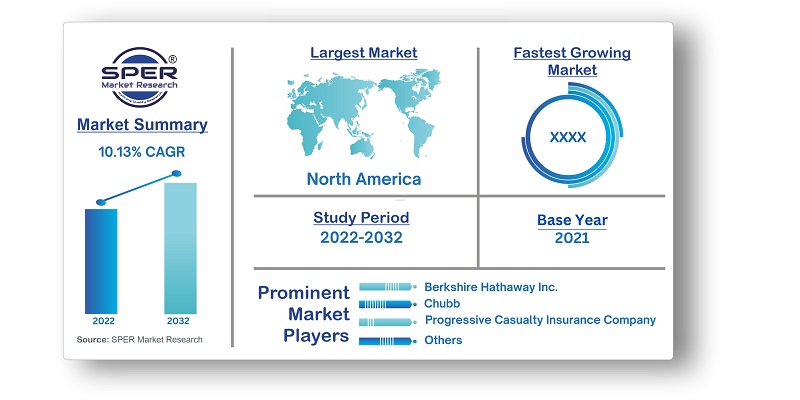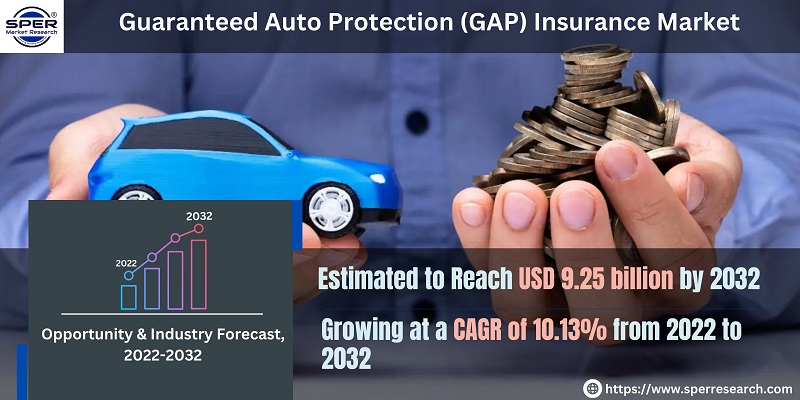
GAP Insurance Market Growth, Size, Share, Demand, Revenue and Future Competition 2032
Guaranteed Auto Protection (GAP) Insurance Market Size- By Type, By Application, By Distribution Channel- Regional Outlook, Competitive Strategies and Segment Forecast to 2032
| Published: Feb-2023 | Report ID: BFSI2304 | Pages: 1 - 224 | Formats*: |
| Category : BFSI | |||


| Report Metric | Details |
| Market size available for years | 2019-2032 |
| Base year considered | 2021 |
| Forecast period | 2022-2032 |
| Segments covered | By Type, By Application, By Distribution Channel. |
| Regions covered | Asia-Pacific, Europe, Middle East and Africa, North America, Latin America |
| Companies Covered | Admiral Group PLC, Allianz, Allstate Insurance Company, American Family Insurance, Aviva, AXA, Berkshire Hathaway Inc., Chubb, Direct Gap, Kemper Corporation, Liberty Mutual Insurance Company, Majesco, Nationwide Mutual Insurance Company, Progressive Casualty Insurance Company, State Farm Mutual Automobile Insurance Company, The Travelers Idemnity Company, Zurich. |
- Return-to-Invoice GAP Insurance
- Finance GAP Insurance
- Vehicle Replacement GAP Insurance
- Return-to-Value GAP Insurance
- Others
- Passenger Vehicle
- Commercial Vehicle
- Agents & Brokers,
- Direct Response,
- Others
- Asia-Pacific
- Europe
- Middle East
- Africa
- North America
- Latin America
- Size of Global GAP Insurance Market (FY’2019-FY’2032)
- Overview of Global GAP Insurance Market
- Segmentation of Global GAP Insurance Market By Type (Return-to-Invoice GAP Insurance, Finance GAP Insurance, Vehicle Replacement GAP Insurance, Return-to-Value GAP Insurance, Others)
- Segmentation of Global GAP Insurance Market By Application (Passenger Vehicle, Commercial Vehicle)
- Segmentation of Global GAP Insurance Market By Distribution Channel (Agents & Brokers, Direct Response, Others)
- Statistical Snap of Global GAP Insurance Market
- Growth Analysis of Global GAP Insurance Market
- Problems and Challenges in Global GAP Insurance Market
- Competitive Landscape in the Global GAP Insurance Market
- Impact of COVID-19 and Demonetization on Global GAP Insurance Market
- Details on Recent Investment in Global GAP Insurance Market
- Competitive Analysis of Global GAP Insurance Market
- Major Players in the Global GAP Insurance Market
- SWOT Analysis of Global GAP Insurance Market
- Global GAP Insurance Market Future Outlook and Projections (FY’2019-FY’2032)
- Recommendations from Analyst
1.1. Scope of the report1.2. Market segment analysis
2.1 Research data source
2.1.1 Secondary data2.1.2 Primary data2.1.3 SPER’s internal database2.1.4 Premium insight from KOL’s
2.2 Market size estimation
2.2.1 Top-down and Bottom-up approach
2.3 Data triangulation
4.1. Driver, Restraint, Opportunity and Challenges analysis
4.1.1 Drivers4.1.2 Restraints4.1.3 Opportunities4.1.4 Challenges
4.2. COVID-19 Impacts of the Global GAP Insurance Market
5.1. SWOT analysis
5.1.1 Strengths5.1.2 Weaknesses5.1.3 Opportunities5.1.4 Threats
5.2. PESTEL analysis
5.2.1 Political landscape5.2.2 Economic landscape5.2.3 Social landscape5.2.4 Technological landscape5.2.5 Environmental landscape5.2.6 Legal landscape
5.3. PORTER’S five forces analysis
5.3.1 Bargaining power of suppliers5.3.2 Bargaining power of Buyers5.3.3 Threat of Substitute5.3.4 Threat of new entrant5.3.5 Competitive rivalry
5.4. Heat map analysis
6.1 Global GAP Insurance Manufacturing Base Distribution, Sales Area, Product Type6.2 Mergers & Acquisitions, Partnerships, Product Launch, and Collaboration in Global GAP Insurance Market
7.1 Return-to-Invoice GAP Insurance7.2 Finance GAP Insurance7.3 Vehicle Replacement GAP Insurance7.4 Return-to-Value GAP Insurance7.5 Others
8.1 Passenger Vehicle8.2 Commercial Vehicle
9.1 Agents & Brokers,9.2 Direct Response,9.3 Others
10.1 Global GAP Insurance Market and Market Share by Region (2019-2025)10.2 Global GAP Insurance Market and Market Share by Region (2026-2032)10.3 Asia-Pacific
10.3.1 Australia10.3.2 China10.3.3 India10.3.4 Japan10.3.5 South Korea10.3.6 Rest of Asia-Pacific
10.4 Europe
10.4.1 France10.4.2 Germany10.4.3 Italy10.4.4 Spain10.4.5 United Kingdom10.4.6 Rest of Europe
10.5 Middle East and Africa
10.5.1 Kingdom of Saudi Arabia10.5.2 United Arab Emirates10.5.3 Rest of Middle East & Africa
10.6 North America
10.6.1 Canada10.6.2 Mexico10.6.3 United States
10.7 Latin America
10.7.1 Argentina10.7.2 Brazil10.73 Rest of Latin America
11.1 Admiral Group PLC
11.1.1 Company details11.1.2 Financial outlook11.1.3 Product summary11.1.4 Recent developments
11.2 Allianz
11.2.1 Company details11.2.2 Financial outlook11.2.3 Product summary11.2.4 Recent developments
11.3 Allstate Insurance Company
11.3.1 Company details11.3.2 Financial outlook11.3.3 Product summary11.3.4 Recent developments
11.4 American Family Insurance
11.4.1 Company details11.4.2 Financial outlook11.4.3 Product summary11.4.4 Recent developments
11.5 Aviva
11.5.1 Company details11.5.2 Financial outlook11.5.3 Product summary11.5.4 Recent developments
11.6 AXA
11.6.1 Company details11.6.2 Financial outlook11.6.3 Product summary11.6.4 Recent developments
11.7 Berkshire Hathaway Inc.
11.7.1 Company details11.7.2 Financial outlook11.7.3 Product summary11.7.4 Recent developments
11.8 Chubb
11.8.1 Company details11.8.2 Financial outlook11.8.3 Product summary11.8.4 Recent developments
11.9 Direct Gap
11.9.1 Company details11.9.2 Financial outlook11.9.3 Product summary11.9.4 Recent developments
11.10 Kemper Corporation
11.10.1 Company details11.10.2 Financial outlook11.10.3 Product summary11.10.4 Recent developments
11.11 Liberty Mutual Insurance Company
11.11.1 Company details11.11.2 Financial outlook11.11.3 Product summary11.11.4 Recent developments
11.12 Majesco
11.12.1 Company details11.12.2 Financial outlook11.12.3 Product summary11.12.4 Recent developments
11.13 Nationwide Mutual Insurance Company
11.13.1 Company details11.13.2 Financial outlook11.13.3 Product summary11.13.4 Recent developments
11.14 Progressive Casualty Insurance Company
11.14.1 Company details11.14.2 Financial outlook11.14.3 Product summary11.14.4 Recent developments
11.15 State Farm Mutual Automobile Insurance Company
11.15.1 Company details11.15.2 Financial outlook11.15.3 Product summary11.15.4 Recent developments
11.16 The Travelers Idemnity Company
11.16.1 Company details11.16.2 Financial outlook11.16.3 Product summary11.16.4 Recent developments
11.17 Zurich
11.17.1 Company details11.17.2 Financial outlook11.17.3 Product summary11.17.4 Recent developments
SPER Market Research’s methodology uses great emphasis on primary research to ensure that the market intelligence insights are up to date, reliable and accurate. Primary interviews are done with players involved in each phase of a supply chain to analyze the market forecasting. The secondary research method is used to help you fully understand how the future markets and the spending patterns look likes.
The report is based on in-depth qualitative and quantitative analysis of the Product Market. The quantitative analysis involves the application of various projection and sampling techniques. The qualitative analysis involves primary interviews, surveys, and vendor briefings. The data gathered as a result of these processes are validated through experts opinion. Our research methodology entails an ideal mixture of primary and secondary initiatives.



Frequently Asked Questions About This Report
PLACE AN ORDER
Year End Discount
Sample Report
Pre-Purchase Inquiry
NEED CUSTOMIZATION?
Request CustomizationCALL OR EMAIL US
100% Secure Payment






Related Reports
Our Global Clients
Our data-driven insights have influenced the strategy of 200+ reputed companies across the globe.




















